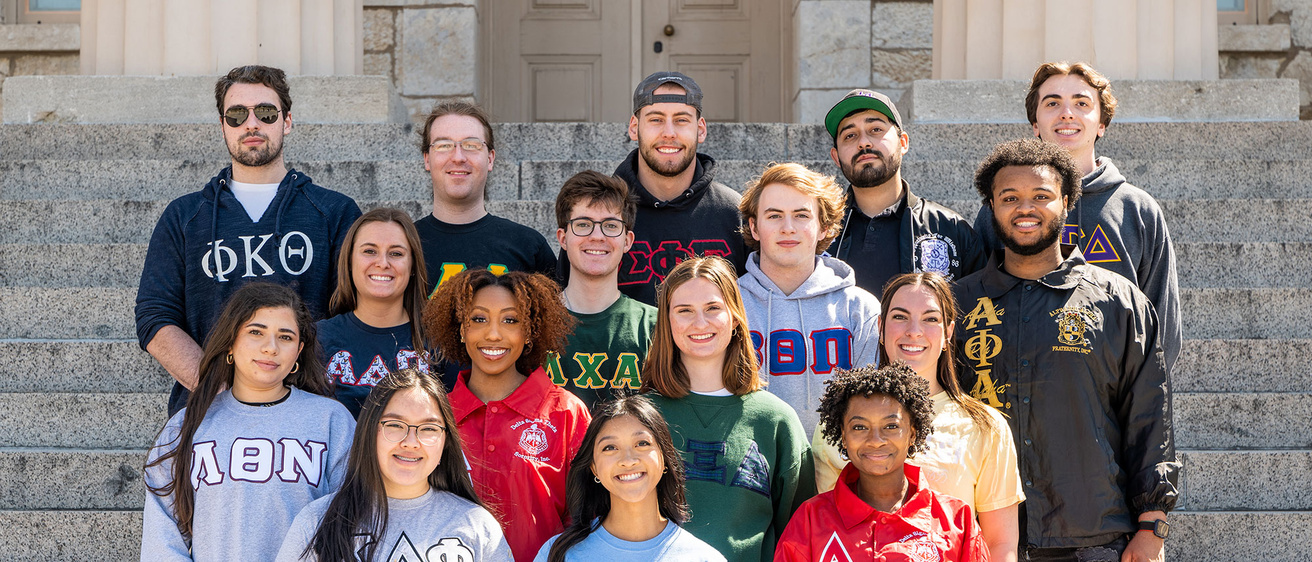Why join a fraternity or sorority at Iowa?

Grace Kohlhof
"Graduation was such a stressful time for me but what made it a positive experience was my sorority sisters standing next to me, pushing me out of my comfort zone and celebrating my successes. I’m so excited to be an alum for my chapter and embrace lifelong sisterhood"

Mary Oriho
"I chose NPHC because I wanted to be a part of a community that not only demands excellence and greatness from its members but also an organization that gives back to the communities that built it. It’s the sisterhood of a lifetime that I will forever be blessed with, and the light that shone through my darkness."

AJ Moss
"I joined Fraternity and Sorority Life because I was looking for an organization to teach me persistence in my academic and professional life. I also wanted to gain a brotherhood that is not for college days alone."
How the process works
Step 1: Attend a Council Orientation Session
Attend an orientation session for the council you are interested in joining.
- Browse the councils here
- These orientation sessions are a broad overview of what to expect and what should be understood as you begin your journey in Fraternity and Sorority Life. *Attendance at orientation is mandatory for anyone seeking to join a fraternity or sorority.
Step 2: Participate in Council Recruitment Process
Once you've chosen a council, learn their recruitment process.
Each of our four council's joining processes looks different, so check out those you are interested in. It's important to do your research on the process for the council you are hoping to join. More information on each of our councils and their joining processes can be found on the pages below. There are student leaders for each council as well who can help answer questions and guide you through the process.
Step 3: Sign the Online Gold Card
Sign the online Gold Card.
Once you have received and accepted an invitation to membership, you will receive an email to your Iowa email address containing information about completing the online Gold Card.
It's a requirement that each new member sign the Online Gold Card.
This includes information about the obligations of membership so make sure you have read it over closely!
Step 4: New Member Academy
Complete the new member academy.
This online course, housed on ICON, is a broad overview of what it means to be a member of a fraternity or sorority at Iowa. New Member Academy consists of six modules that introduce new members to concepts that are frequently discussed and used as topics of education across all chapters and councils.
The modules are: Overview of the FSL Community, Academic Excellence, Health, Safety, and Wellness, Civil Rights Compliance, Involvement and Leadership Opportunities, and Bystander Intervention.
Get the details
Financial Responsibilities
Fraternity and sorority costs
Financial responsibility is important for all college students. Every member of a fraternity or sorority agrees to be fiscally responsible as a student and as an organization member. We have provided the following information as a guide while making your joining decision and as a resource allowing you to be fully informed on all aspects of financial responsibility.
The fraternity and sorority experience is an investment in your future. Fraternal organizations' fees go to programs and services that will positively impact you throughout your time as a member. To assist members, chapters may offer various scholarships, grants, and payment plans. We encourage you to ask questions related to finances during the recruitment process. We also encourage families to be "hands-on" in this decision if you have any questions about the financial obligations. Costs will vary if the organization does or does not have a chapter structure.
Membership dues/fees may include local and national membership dues, room and board (if the organization has a structure), meals, and other one-time fees such as initiation or new member fees. The charts below provide you with the 2024-2025 financial averages for each council. They include the high, low, and average costs within that council.
*For 2024-2025, the average cost of living in a university-owned residence hall per academic year for a double room and unlimited meals is $12,616.00.
Costs differentiated by council
National Pan-Hellenic Council:
| LOW | AVERAGE | HIGH |
|---|---|---|
| $100 | $700 | $2,100 |
Multicultural Greek Council:
| LOW | AVERAGE | HIGH |
|---|---|---|
| $165 | $450 | $900 |
Panhellenic Council:
| Housed/Un-housed | LOW | AVERAGE | HIGH |
|---|---|---|---|
| Housed | $7,500 | $9,850 | $12,100 |
| Un-Housed | $1,000 | $2,400 | $3,500 |
Interfraternity Council:
| housed/un-housed | LOW | AVERAGE | HIGH |
|---|---|---|---|
| Housed | $3,500 | $8,800 | $13,600 |
| Un-Housed | $600 | $1,600 | $2,600 |
Council dues
Every semester, each of our governing councils assesses membership dues to all of the organizations that fall within their respective council. These dues are collected to ensure continued council operations, programming, education, and support for member chapters. Dues are determined based on the total number of members on the organization's roster with Fraternity and Sorority Life. Each council's semester dues amount is listed below:
- National Pan-Hellenic Council: $15 per member
- Multicultural Greek Council: $20 per member
- Panhellenic Council: $17 per member
- Interfraternity Council: $25 per new member, $17 per active member
FSL programming fee
Understanding the FSL Programming Fee
Fraternity and Sorority Life (FSL) at the University of Iowa assesses a Programming Fee to individual members of all officially recognized Fraternity and Sorority Life organizations on campus regardless of council affiliation. This fee will be charged to individual students’ UBill accounts based on sorority and fraternity membership.
The fee will supplement the funds that the University of Iowa already dedicates towards the members of Fraternity and Sorority Life. The funds are used for the following:
- Educational programs
- Leadership development opportunities
- Prevention and wellness programming
- Staff support from Fraternity and Sorority Life
During the fall semester, the FSL Programming Fee will be billed to returning members on September 1st, and to fall new members on November 15th. During the spring semester, the FSL Programming Fee will be billed to returning members on February 1st, and to spring new members on April 15th.
Fee Requirement Understanding:
University of Iowa Fraternity and Sorority Life, Programming Fee Student Agreement:
By joining a fraternity or sorority, you are acknowledging your understanding of and agreement to the following Terms and Conditions. Please read carefully.
Participation in a fraternity or sorority is optional and remains a choice of the student. As such, by agreeing to become or remain a member of a fraternity or sorority advised by Fraternity and Sorority Life, you agree to pay the programming fee assessed to all students with the amount dependent upon the council of which you are a member. The programming fee is assessed each semester and applied to your U-Bill. Please review the Billing Policies and Procedures from the University Billing Office to understand financial responsibilities and processes.
Fraternity and Sorority Life, Programming Fee
Fee amounts
The programming fee for each member is dependent on which governing council the organization is a part of.
- Interfraternity Council and Panhellenic Council Members: $50.00/semester.
- Multicultural Greek Council and National Pan-Hellenic Council Members: $25.00/semester.
This fee is an expectation for all members since their organizations receive additional benefits and support from the university beyond other self-governing student organizations that have selective membership processes.
In the case where a student is incorrectly billed due to the fraternity or sorority organization failing to update its roster by the stated dates, the student will be refunded and the organization will be charged (IFC/PHC- $50 per student; NPHC/MGC- $25 per student).
Delayed Recruitment
FSL Delayed Recruitment & Intake Policy
Joining fraternities and sororities will be delayed the first 3 weeks of the fall semester each academic year for first-year students.
Beginning the Monday of the fourth week of classes in the fall semester, fraternities and sororities will be eligible to recruit or conduct intake for first-year students as part of the joining process designed by their council, chapter, and/or inter/national organization.
Beginning the first day of the fall semester, fraternities and sororities are eligible to recruit or conduct intake for the following classifications of University of Iowa students as part of the joining process designated by their council, chapter, and/or inter/National organization:
- Students in their second semester or beyond
- Transfer students
Council-specific considerations
Interfraternity Council (IFC)
Primary recruitment dates will be established after the 3-week delayed window during a timeframe that considers campus traditions, events, and spiritual holidays.
IFC organizations are eligible to host recruitment events and extend bids to any students beyond their first semester at the University of Iowa or transfer students prior to the primary recruitment process hosted by the Council.
Multicultural Greek Council (MGC)
If MGC organizations plan to recruit first-year students, they must delay recruitment activities until the Monday of the fourth week of the fall semester.
If MGC organizations plan to recruit only students beyond their first semester or transfer students, they may begin recruitment activities on the Monday of the second week of the fall semester.
National Pan-Hellenic Council (NPHC)
NPHC organizations will be able to conduct intake any time throughout the academic year due to their individual chapter eligibility requirements (i.e. credits earned).
Panhellenic Council (PHC)
Primary recruitment dates will be established after the 3-week delayed window during a timeframe that considers campus traditions, events, and spiritual holidays.
PHC organizations are not able to conduct continuous open bidding (COB) when registration for primary recruitment is open, so chapters are unable to extend bids to students beyond their first semester at the University of Iowa or transfer students before primary recruitment.
In the fall semester, students beyond their first semester at the University of Iowa or transfer students can participate in either primary recruitment or COB after primary recruitment has concluded.
Frequently Asked Questions
For helpful answers to dozens of additional questions, please visit our FAQ page.
We're here to help

Alicia Hein
“As a proud former member of the Fraternity and Sorority Life community at the University of Iowa, I know firsthand how transformative and empowering the experience can be. Now, I have the privilege of helping students navigate their own FSL journeys, whether that’s building community, growing as leaders, or overcoming challenges. I work to ensure every student feels seen, supported, and empowered to make the most of their time in FSL.”

Chad Warrick
"Through education and coaching, I have the opportunity to witness fraternity and sorority members at Iowa build community through lifelong friendships and as a result of their experience grow as people and as leaders. It is incredibly rewarding to know that our work contributes to the individual success of Hawkeye students and collective success of our chapters, while also preparing our future alumni to go out and make a difference in the world."

William Keen
"Fraternity and Sorority Life at the University of Iowa offers students so much more than social connection; it builds lifelong leadership skills, fosters a deep sense of community, and creates opportunities to serve and grow. I’ve seen students discover their purpose, find their voice, and make a real impact through their involvement in Fraternity and Sorority Life."

